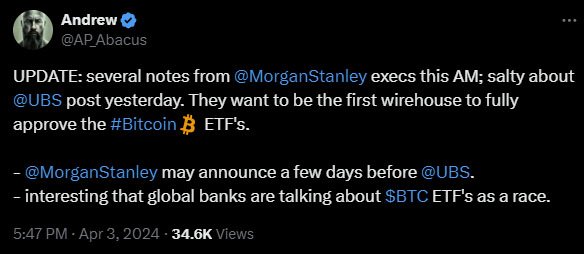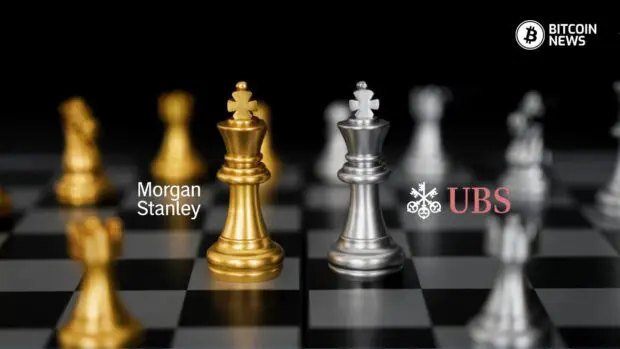Investment banking giants Morgan Stanley and UBS are locked in a tight race to introduce the first spot Bitcoin Exchange-Traded Funds (ETFs) in the United States. This competition underscores the increasing acceptance of Bitcoin within traditional banking sectors and could have far-reaching implications for investors.
Morgan Stanley: The Race for First Mover Advantage
Both Morgan Stanley and UBS are eagerly vying to secure the title of being the first major bank to offer Bitcoin ETFs. Reports suggest that Morgan Stanley appears poised to edge out UBS in this race, with insider sources indicating that an announcement could be imminent.

This strategic move by Morgan Stanley highlights a broader shift towards embracing digital assets within the conventional financial ecosystem. The news was announced by Andrew Parish, co-founder of Arch Public on X. Before publishing the latest update, Andrew stated that UBS intends to introduce Bitcoin ETFs on its platform from April 8 to April 12. Recent speculation suggests Morgan Stanley may counter UBS after Andrew’s report of the bank’s forthcoming approval of Bitcoin ETFs.
Andrew wrote on March 26:
“Several sources confirm that Morgan Stanley is set to approve Bitcoin ETFs on its platform in the next two weeks.”
Navigating Regulatory Hurdles and Analysts’ Perspective
Despite the excitement surrounding the potential launch of Bitcoin ETFs, major banks like Morgan Stanley and UBS are navigating a complex compliance landscape. Eric Balchunas, a Bloomberg ETF expert, describes the situation as a “compliance game of chicken,” with each bank waiting for the other to make the first move. This cautious approach underscores the regulatory uncertainties that still linger in the digital asset space.
Eric Balchunas states: “FWIW I heard from solid source none of them have added the bitcoin ETFs, still in holding pattern, in a compliance game of chicken, waiting for one of them to go first then gives rest cover. So prob will be an all at once type moment when that is tho is q(estions)” emphasizing the strategic waiting game being played by banks.
According to Balchunas, regulatory compliance is the key factor influencing the timing of the launch. He predicts that once one bank receives approval, others are likely to follow swiftly. He emphasizes the potential impact of ETFs on increasing accessibility and demand for bitcoin among traditional investors.
On the other hand, Despite ETF approval, certain prominent U.S. banks remain doubtful about Bitcoin’s legitimacy. Goldman Sachs’ top investment officer, Sharmin Mossavar-Rahmani, a Bitcoin skeptic, spoke to the Wall Street Journal on April 2, she stated, “We do not think it is an investment asset class, we’re not believers in crypto.”
The Significance of Bitcoin ETFs
The introduction of spot Bitcoin ETFs would mark a significant milestone in mainstream Bitcoin adoption. These ETFs, which would directly track the price of bitcoin, are highly anticipated by investors for their potential to make investing in bitcoin more accessible and familiar through traditional brokerage accounts.
A spokesperson for UBS previously mentioned that spot Bitcoin ETFs are only suitable for “aggressive investors,” reflecting the cautious stance of some major banks towards Bitcoin. On January 29th, UBS issued an official statement regarding spot Bitcoin ETFs, stating:
“It remains to be seen if the issuers will be able to distinguish themselves in terms of ability to manage the product during turbulent markets.”
The launch of Bitcoin ETFs by institutional giants like Morgan Stanley and UBS could offer several advantages to investors. These include easier access to Bitcoin investment, exposure through familiar brokerage platforms, and the potential for increased demand that could influence bitcoin’s price.
Conclusion
The ongoing race between Morgan Stanley and UBS to launch the first Bitcoin ETF highlights the growing acceptance of Bitcoin within the traditional financial world. The imminent introduction of spot Bitcoin ETFs could open up new avenues for investment and significantly impact the digital asset landscape. As investors eagerly await further developments, the competition between these banking giants continues to intensify, shaping the future of this new asset class.










